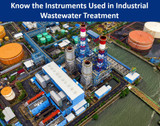Know About Contribution of Hand Sanitizers in Protection against COVID-19
Posted by David Cannon on 3rd Jun 2021

COVID-19 (Coronavirus) has been a global concern since 2020. Several preventive measures are advised by medical and healthcare organizations like World Health Organization (WHO). The use of alcohol-based hand sanitizers is one of the advised preventive measures against coronavirus. However, the use of hand sanitizers has become quite a topic of debate as to either it is effective to kill the coronavirus or not. Certainly, the debate has raised questions like are hand sanitizers truly effective,
What Are Chemical Metering Pumps and When They Are Used?
Posted by David Cannon on 20th May 2021

Chemical metering is an essential activity in chemical industries. The chemicals are used in measured or metered quantities because a lower dose of chemicals might underperform but an overdose of chemicals might be toxic. The chemical metering pumps are used for metering chemicals in the required quantity. The metering pumps are widely used in industrial applications such as chemical injections for water purification, dye injection for plastic production, fluid metering in industrial systems, et
Know the Instruments Used in Industrial Wastewater Treatment
Posted by David Cannon on 30th Mar 2021

Water is required in many industrial processes, and hence may get polluted or could be released into the environment along with several toxins and chemicals mixed in it. Just as access to clean water is a basic necessity for all humans, so is purifying and recycling wastewater first to make it usable in specific areas. Next, removing and destroying contaminants, chemicals, and other harmful agents that may be toxic to human health and the environment is important. So, wastewater treatment is a
Why Use Centrifugal Pumps in Sanitary Industry?
Posted by David Cannon on 22nd Feb 2021

Safety and sanitation are imperative requisites across industries, especially food & beverage, and other high-purity applications. Manufacturers have to work hard to meet the demands. In the sanitary industry, a streamlined system with the right equipment and tools can make a significant difference. Centrifugal pumps are most commonly used in the sanitary industry for maintaining the purity of the product without any risk of contamination. Popularly called sanitary centrifugal pumps, they are ea
